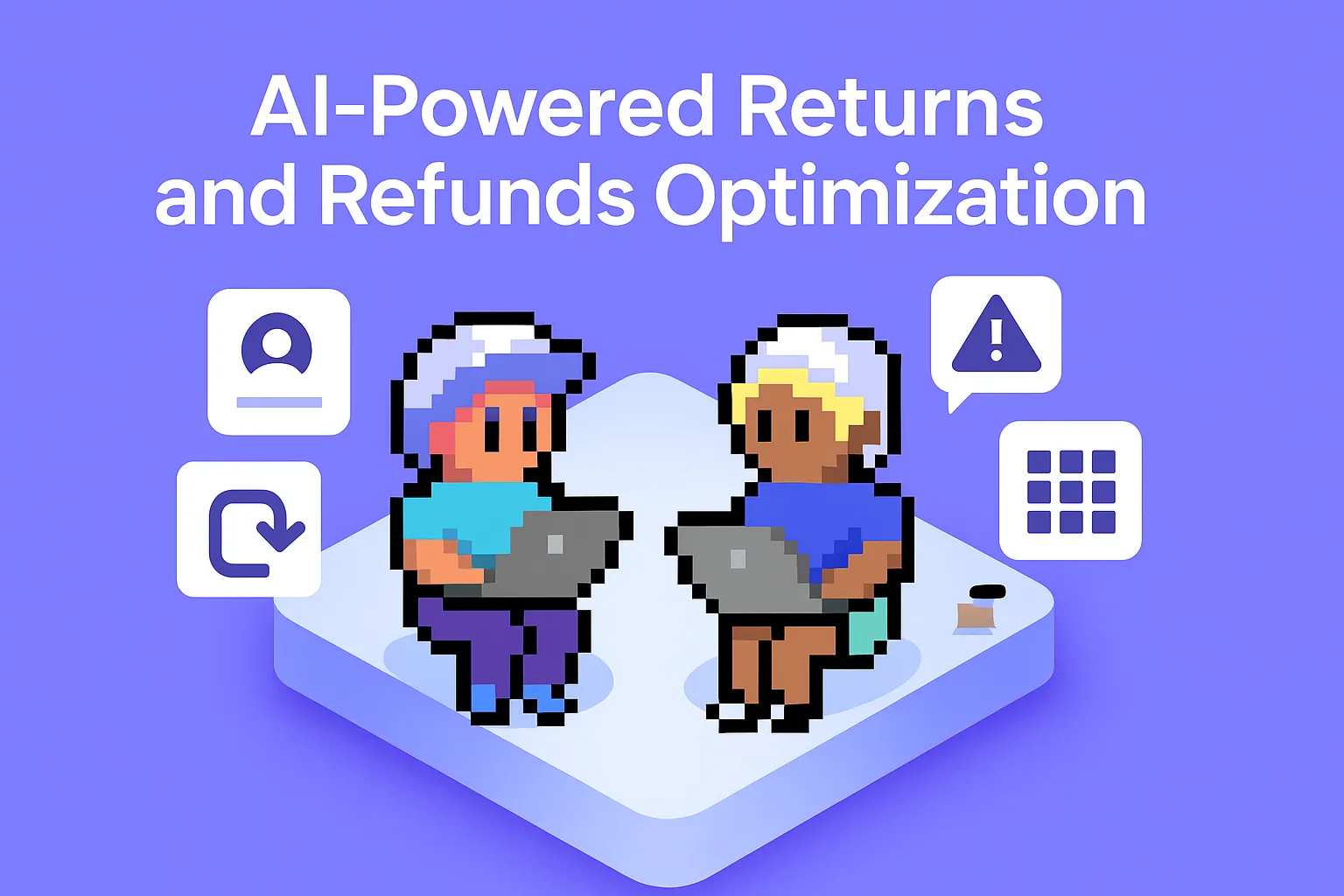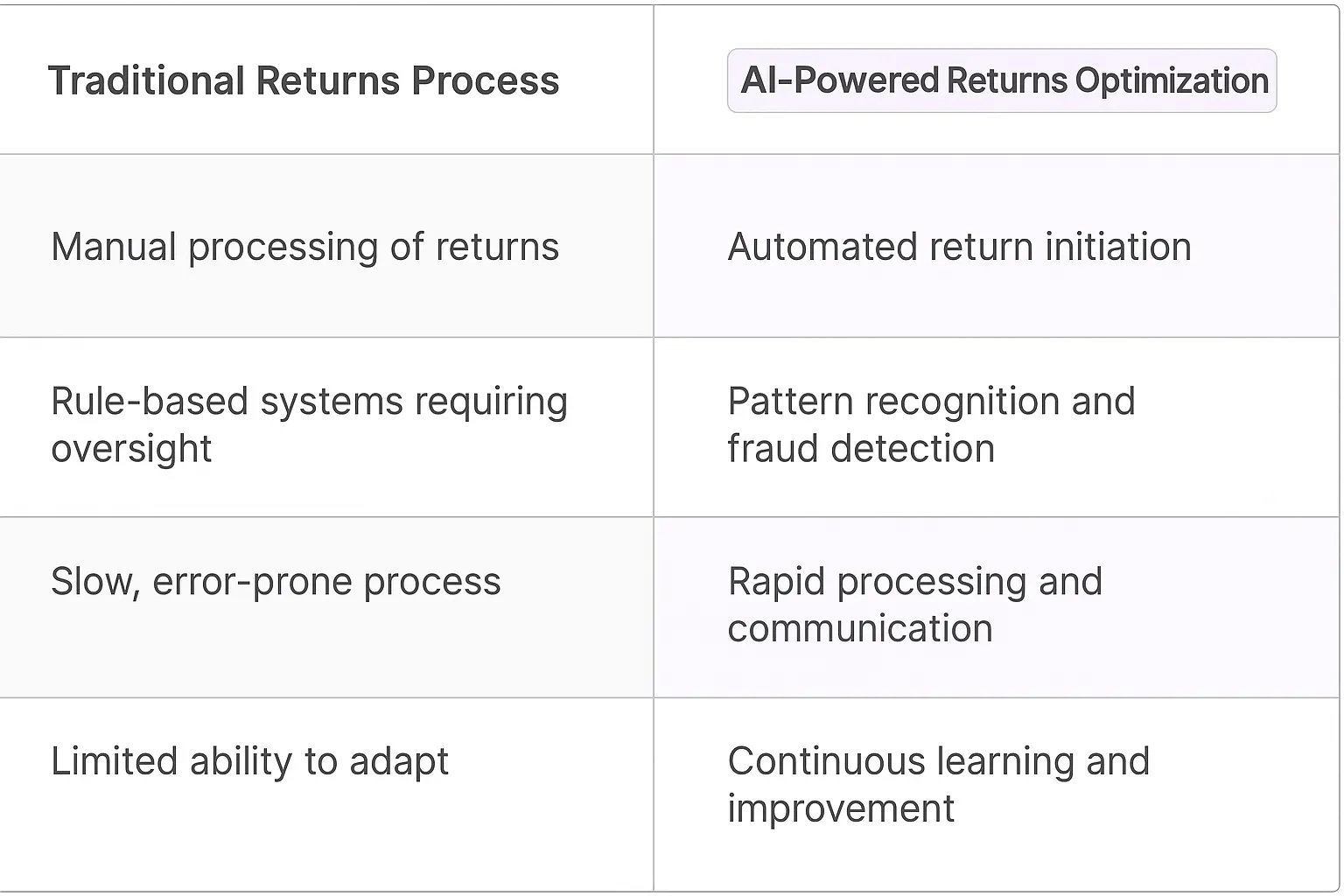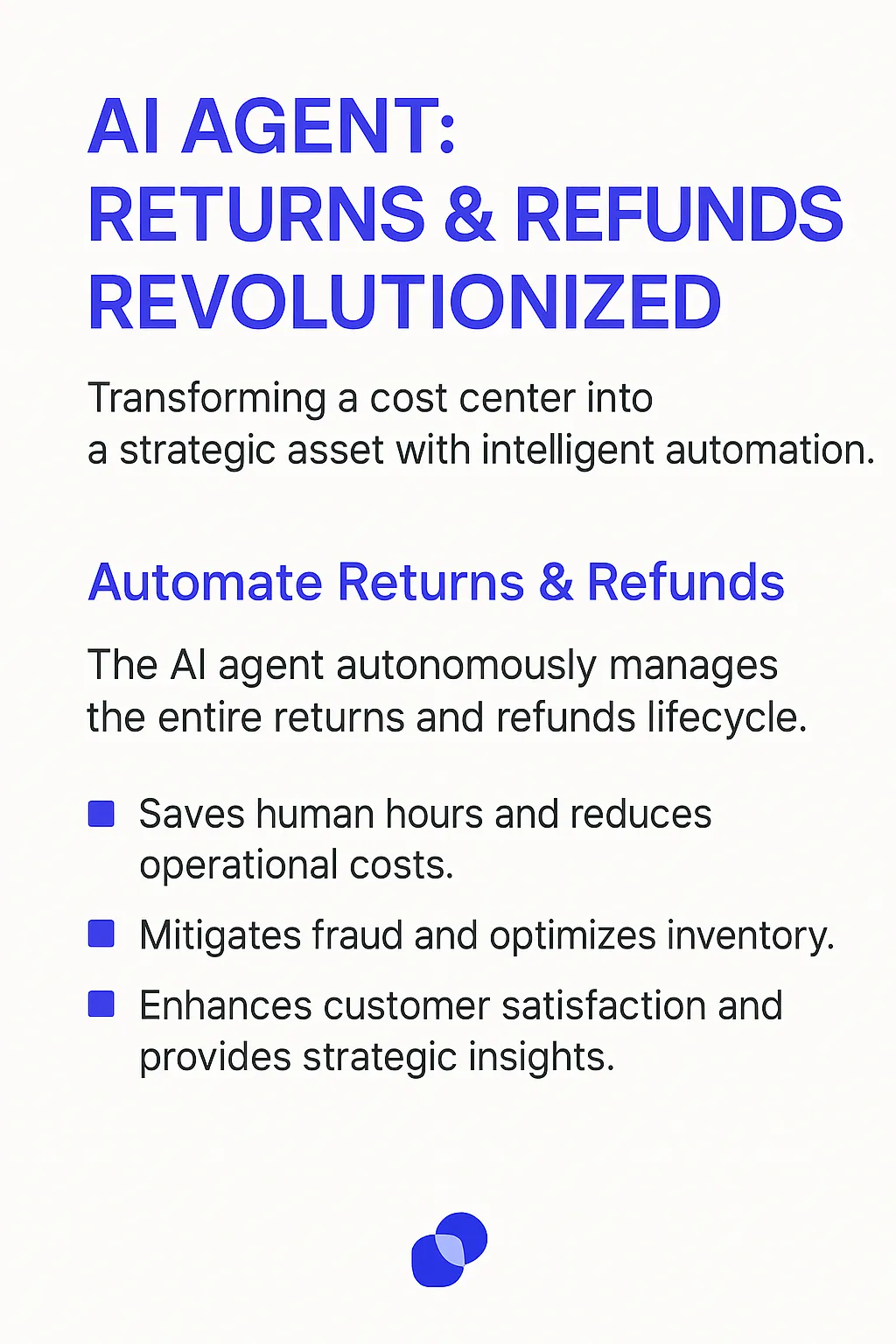Returns and Refunds Process Optimization AI Agents
Revolutionizing Returns and Refunds with AI-Powered Optimization
What is Returns and Refunds Process Optimization?
Returns and Refunds Process Optimization is the art and science of streamlining the way businesses handle product returns and issue refunds. It's about turning a potential pain point into a smooth, efficient operation that enhances customer satisfaction and protects the bottom line. With AI agents, this process becomes a dynamic, intelligent system that adapts to each unique situation, learning and improving with every interaction.
Key Features of Returns and Refunds Process Optimization
The key features of this AI-powered approach include rapid processing of return requests, intelligent decision-making on refund approvals, personalized customer communication, fraud detection, and real-time inventory updates. These digital teammates excel at pattern recognition, allowing them to spot trends in return reasons and provide valuable insights for product development. They bring consistency to the process, ensuring equitable treatment for all customers while continuously learning and improving their performance over time.

Benefits of AI Agents for Returns and Refunds Process Optimization
What would have been used before AI Agents?
Before AI agents entered the scene, companies relied on a hodgepodge of manual processes and rigid rule-based systems to handle returns and refunds. Customer service reps would spend hours slogging through paperwork, deciphering return reasons, and manually updating inventory systems. It was a slow, error-prone process that left both customers and businesses frustrated.
Legacy software solutions offered some improvements but still required significant human oversight. These systems often struggled with edge cases and couldn't adapt to changing business needs without extensive reprogramming. The result? A returns process that was about as agile as a cargo ship trying to do a U-turn in a narrow canal.
What are the benefits of AI Agents?
Enter AI agents - the game-changers in the returns and refunds arena. These digital teammates bring a level of intelligence and adaptability that's transforming how businesses handle this critical aspect of customer service.
First off, AI agents can process and analyze return requests at lightning speed. They're like the Usain Bolt of data processing, but without the need for rest or energy drinks. This rapid analysis allows for near-instantaneous decision-making on refund approvals, significantly reducing wait times for customers.
But speed is just the beginning. AI agents excel at pattern recognition, allowing them to spot trends in return reasons that human analysts might miss. This insight is gold for product development teams, helping them identify and fix issues before they become widespread problems.
Another key benefit is the ability of AI agents to personalize the returns experience. They can tailor communication and offers based on a customer's history, potentially turning a return into an exchange or even a larger sale. It's like having a savvy salesperson who remembers every interaction with every customer, but without the need for coffee breaks.
AI agents also bring consistency to the returns process. Unlike human agents who might have good days and bad days (we've all been there), AI maintains a steady level of performance. This consistency helps in maintaining quality control and ensures that all customers receive equitable treatment.
Perhaps most importantly, AI agents can learn and improve over time. As they process more returns, they become more efficient and accurate. It's like having an employee who gets better at their job every single day, without ever asking for a raise or complaining about the office temperature.
The integration of AI agents into returns and refunds processes isn't just an incremental improvement - it's a quantum leap. It's the difference between using a abacus and a supercomputer. As businesses continue to adopt and refine these technologies, we can expect to see even more innovative applications that will further enhance customer satisfaction and operational efficiency.

Potential Use Cases of AI Agents for Returns and Refunds Process Optimization
Processes
Let's dive into how AI agents can transform the returns and refunds game. These digital teammates aren't just fancy chatbots; they're the secret sauce that can make your customer service team shine.
First up, automated return initiation. AI agents can handle the initial contact when a customer wants to return an item. They'll ask the right questions, validate the purchase, and kick off the return process without human intervention. This frees up your team to handle the trickier cases that need a human touch.
Next, intelligent refund routing. Based on the return reason and product type, AI agents can determine the optimal refund method. Maybe it's a straight-to-card refund for a defective item, or store credit for a change-of-mind return. This smart routing can significantly reduce processing time and improve customer satisfaction.
Then there's predictive analytics for return trends. AI agents can crunch the numbers on return patterns, flagging potential issues with specific products or identifying seasonal trends. This intel is gold for inventory management and product development teams.
Tasks
Now, let's break it down to the nitty-gritty tasks where AI agents can really flex their muscles:
Return label generation: AI agents can instantly create and email return labels to customers, cutting down on wait times and reducing the load on your customer service team.
Fraud detection: By analyzing return patterns and customer history, AI agents can flag potentially fraudulent returns for further investigation, protecting your bottom line.
Inventory updates: As soon as a return is initiated, AI agents can update inventory systems, ensuring accurate stock levels and potentially triggering reorders if needed.
Customer communication: AI agents can handle the entire communication flow, from confirming receipt of returned items to notifying customers about refund status, all in a personalized, on-brand voice.
Refund processing: For straightforward cases, AI agents can initiate and process refunds automatically, dramatically reducing the time between return receipt and refund issuance.
Data analysis and reporting: AI agents can continuously analyze return data, generating insights on product performance, customer satisfaction, and process efficiency. This isn't just number-crunching; it's actionable intelligence that can drive business decisions.
The beauty of these AI agents is their ability to learn and improve over time. They're not static tools; they're evolving digital teammates that get smarter with every interaction. And that's the kind of exponential improvement that can give your business a serious edge in customer satisfaction and operational efficiency.

Industry Use Cases: AI Agents Transforming Returns and Refunds
The versatility of AI agents in returns and refunds process optimization makes them valuable across various industries. Let's dive into some meaty, industry-specific use cases that showcase how AI can reshape workflows and processes.
AI agents aren't just fancy chatbots or glorified automation tools. They're digital teammates that can handle complex tasks, learn from interactions, and make nuanced decisions. In the returns and refunds space, this translates to a complete overhaul of how businesses manage customer satisfaction, inventory, and financial operations.
What's particularly exciting is how these AI agents adapt to different industry contexts. They're not one-size-fits-all solutions, but rather chameleons that morph to fit the unique challenges of each sector. From e-commerce giants dealing with high-volume returns to luxury brands managing delicate customer relationships, AI agents are proving their worth in surprising and innovative ways.
As we explore these use cases, keep in mind that we're not just talking about incremental improvements. These AI implementations are fundamentally altering the DNA of returns and refunds processes, creating new possibilities for customer engagement, operational efficiency, and even business models. It's a shift that's as profound as it is wide-reaching.
E-commerce: Transforming Returns into Opportunities
The e-commerce industry is ripe for disruption when it comes to returns and refunds. Let's face it, most online retailers view returns as a necessary evil, a cost center that eats into profits. But what if we could flip the script?
Enter AI-powered returns optimization. These digital teammates are changing the game by turning a traditionally painful process into a goldmine of customer insights and loyalty-building opportunities.
Consider a scenario where a customer initiates a return for a pair of shoes. Instead of a generic form, they're greeted by an AI agent that engages in a conversation. "Hey there! Sorry the shoes didn't work out. Mind if I ask what wasn't quite right?" This simple interaction opens up a world of possibilities.
The AI analyzes the response, cross-references it with the customer's purchase history, and makes tailored suggestions. "Based on your feedback and previous purchases, you might love these similar shoes in a wider fit. Want to exchange instead of refund?"
But it doesn't stop there. The AI is constantly learning, identifying patterns in returns data to inform product development and inventory management. It might notice that a particular shoe style is frequently returned due to sizing issues, prompting the company to adjust its size guide or even tweak the product design.
The result? A dramatic reduction in return rates, increased exchange rates, and a treasure trove of actionable customer feedback. More importantly, it transforms a potentially negative experience into a personalized, positive interaction that builds brand loyalty.
This isn't just theory. Companies implementing AI-driven returns processes are seeing conversion rates on exchanges skyrocket by up to 30%. They're turning what was once a pure cost into a revenue-generating opportunity.
The e-commerce players who embrace this shift won't just be optimizing their returns process - they'll be redefining the entire customer experience paradigm. And in an industry where customer loyalty is gold, that's a game-changer.
Automotive: Turning Lemons into Lemonade
The automotive industry is ripe for disruption in the returns and refunds space. We're not talking about returning a $20 t-shirt here; we're dealing with high-ticket items where customer satisfaction can make or break brand loyalty. Enter AI-powered returns optimization for car dealerships and manufacturers.
Think about it. You've just dropped $40k on a new ride, but something's not quite right. Maybe it's the infotainment system that's bugging you, or the seats aren't as comfy as you thought. In the old world, you'd be stuck with a lemon or face a painful return process. But with AI in the mix? It's a whole new ballgame.
These digital teammates are transforming the traditionally adversarial returns process into a customer-centric experience that builds brand loyalty. When a customer initiates a return, they're greeted by an AI that's part therapist, part product expert, and part data analyst.
"Hey there! Sorry to hear your new car isn't living up to expectations. Can you tell me more about what's not working for you?" This simple question kicks off a conversation that's gold for both the customer and the company.
The AI digs deep, analyzing responses against vast datasets of customer feedback, vehicle specs, and even driving habits (if the car's connected). It might discover that customers who dislike the infotainment system often love a different model in the lineup. "Based on your feedback, the XYZ model might be a perfect fit. Want to try a week-long test drive?"
But here's where it gets really interesting. The AI is constantly feeding this data back to the product development teams. Suddenly, they're not just building cars based on focus groups and gut feelings. They're iterating based on real-world, granular customer feedback at scale.
The results? We're seeing dealerships reduce return rates by up to 25% and increase customer satisfaction scores by 40%. But more importantly, they're building a feedback loop that's making their products better with every interaction.
This isn't just about saving a sale or reducing returns. It's about fundamentally changing the relationship between car buyers and manufacturers. It's turning a potential brand detractor into a lifelong advocate.
The automotive players who embrace this AI-driven approach won't just be optimizing their returns process. They'll be creating a continuous improvement cycle that could redefine the entire industry. In a world where brand loyalty is everything, that's not just an advantage - it's the whole game.
Considerations
Technical Challenges
Implementing a Returns and Refunds Process Optimization AI Agent isn't a walk in the park. It's more like trying to teach a robot to juggle while riding a unicycle. The technical hurdles are numerous and complex.
First off, data integration is a beast. You're dealing with multiple systems - order management, inventory, customer service, and financial platforms. Getting these to play nice with your AI agent is like herding cats. Each system speaks its own language, and your AI needs to be fluent in all of them.
Then there's the AI model itself. Training it to understand the nuances of return policies, product conditions, and customer satisfaction is no small feat. It's not just about processing refunds; it's about making judgment calls. Should this slightly worn shoe be accepted for a full refund? That's a decision that even humans struggle with.
Real-time processing is another technical tightrope to walk. Customers expect instant decisions, but your AI needs time to crunch the data and make informed choices. Balancing speed with accuracy is crucial, and it's a constant optimization game.
Operational Challenges
On the operational side, things get even messier. You're essentially asking your team to trust a digital teammate with critical business decisions. That's a tough pill to swallow for many organizations.
Change management becomes your new best friend (or worst enemy). You'll need to convince everyone from the C-suite to the warehouse staff that this AI agent isn't out to steal their jobs, but to make their lives easier. Good luck with that.
Then there's the question of oversight. Who's responsible when the AI makes a mistake? You need a clear chain of command and escalation procedures. It's like having a new employee who works 24/7 but occasionally needs adult supervision.
Let's not forget about the customer-facing aspects. How do you communicate to customers that they're interacting with an AI? Some will love it, others will demand a human. Striking the right balance is crucial for maintaining customer satisfaction.
Lastly, there's the ever-evolving nature of retail. Seasons change, trends shift, and return policies need to adapt. Your AI agent needs to be flexible enough to handle these changes without requiring a complete overhaul every time Black Friday rolls around.
Implementing a Returns and Refunds Process Optimization AI Agent is a complex endeavor that touches every part of your business. It's not for the faint of heart, but for those who pull it off, the rewards can be game-changing. Just be prepared for a wild ride.
AI-Powered Revolution in Returns and Refunds
The integration of AI agents into returns and refunds processes marks a paradigm shift in customer service and operational efficiency. These digital teammates are not just automating tasks; they're reimagining the entire returns experience. From e-commerce giants to automotive dealerships, businesses across industries are leveraging AI to turn returns into opportunities for customer engagement and data-driven insights. While technical and operational challenges exist, the potential rewards are immense. As AI technology continues to evolve, we can expect even more innovative applications that will further enhance customer satisfaction and drive business growth. The future of returns and refunds is here, and it's powered by AI.













